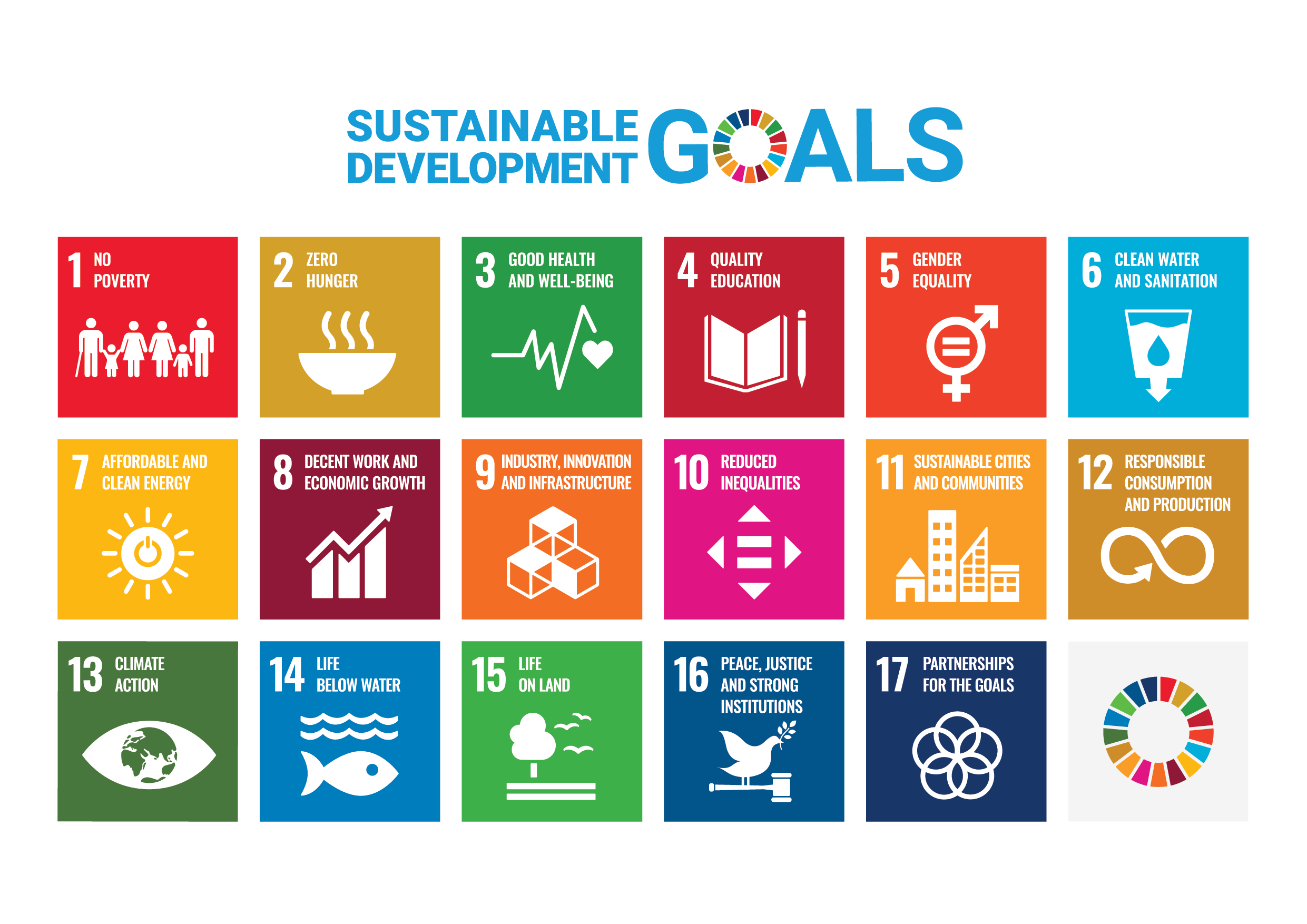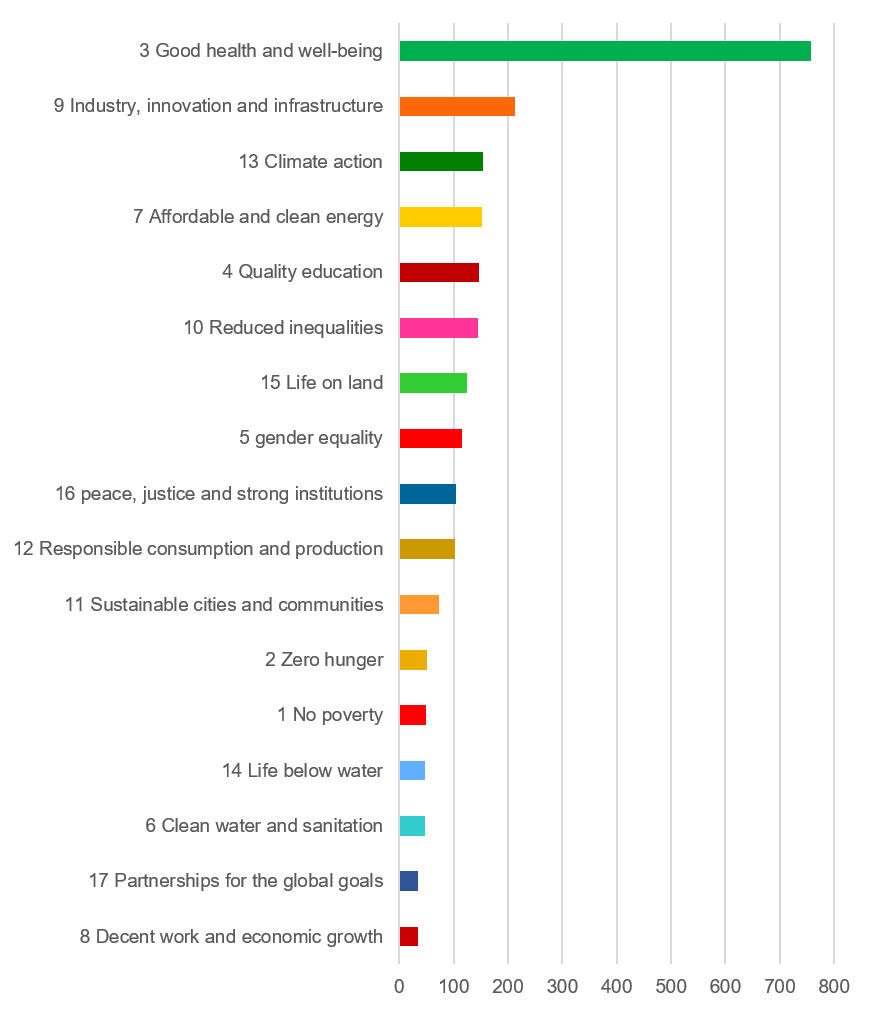Agenda 2030 with 17 Sustainable Development Goals is a joint action plan adopted by the countries of the world. To achieve these goals, the world will have to find solutions to a long list of challenges, at local, national, regional and international level. Many of the solutions are found through new knowledge, research and innovation.

The 17 Sustainable Development Goals. Illustration: UN
Research that contributes to achieving the Sustainable Development Goals
The Swedish Research Council funds research in all scientific fields. Within each field, there are examples of research that in various ways can contribute to solving the challenges.
Since 2021, all researchers who submit a scientific report to us shall state whether their project is relevant for Agenda 2030 – and if so, for which goals (maximum 3).
Of the just under 2 400 reports submitted, just over 60 per cent state that at least one Sustainable Development Goal is relevant for the research.
Half of these goals relate to Goal No 3: Good health and well-being. The second highest number relates to Goal No 9: Industry, innovation and infrastructure, followed by Goal No 13: Climate action.
Projects with relevance for the Sustainable Development Goals
Sustainable Development Goals | Number of projects |
|---|---|
3 Good health and well-being | 758 |
9 Industry, innovation and infrastructure | 213 |
13 Climate action | 154 |
7 Affordable and clean energy | 153 |
4 Quality education | 146 |
10 Reduced inequalities | 145 |
15 Life on land | 125 |
5 gender equality | 115 |
16 peace, justice and strong institutions | 104 |
12 Responsible consumption and production | 102 |
11 Sustainable cities and communities | 74 |
2 Zero hunger | 51 |
1 No poverty | 50 |
14 Life below water | 48 |
6 Clean water and sanitation | 47 |
8 Decent work and economic growth | 35 |
17 Partnerships for the global goals | 35 |
Development research has sustainability as the main focus
The Swedish Research Council funds projects in development research using funding from the development aid budget. Development research is interdisciplinary or multidisciplinary and covers research in all scientific fields. The research shall contribute to knowledge about the causes and consequences of poverty, and possible solutions to poverty. It shall also contribute to knowledge about sustainable development and links between sustainable development and the fight against poverty and other societal challenges in the least developed countries and regions around the world.
The reported projects in development research include all the goals as relevant, and span a great range of research fields, such as research into development aid, violent conflicts, agriculture, effects of climate change, sexual and reproductive health, “one health”, water and sanitary engineering, infectious diseases, and healthcare systems.
Medicine and health
In this field, we fund research into areas such as understanding and finding cures for diseases, global health, antibiotic resistance, and healthcare on equal terms.
Clinical therapy research
Here we fund clinical studies into biomedical or health-related issues. These can, for example, relate to the development of medicines, treatment methods, or medical devices.
Humanities and social sciences
In humanities and social sciences, we fund projects relating to peacebuilding, militarisation and violent conflicts, social movements, cultural heritage, racism and discrimination, political representation, integration and segregation.
Natural and engineering sciences
In natural and engineering sciences we fund research into areas such as medical technology, sustainable energy, new materials, climate change impact on species and ecosystems, and also climate modelling.
Educational sciences
In this field, we fund research into educational systems, education history, pedagogics and methods for learning, and segregation and integration in schools.
Artistic research
Here we fund areas such as tools for visualising the effects of climate change and research into forms of expressing transition to sustainable development.
Research infrastructure
Researchers often need advanced tools to enable them to conduct their research – known as research infrastructure. The Swedish Research Council funds research infrastructure both within Sweden and internationally. This enables large-scale research into areas such as the environment and natural resources, materials, energy solutions, health, digitisation and the human capacity for transition. The facilities ESS (European Spallation Source) and MAX IV are examples of infrastructures that contribute with tools for research in these fields. Several of the research infrastructures we fund also enable collaboration across subject borders, which is entirely crucial for achieving the goals in Agenda 2030.
Collaboration with others
The global goals concern us all, and require collaboration between different actors and across national borders. Below are some examples of collaborations that the Swedish Research Council are part of.
GD-forum
GD-forum is a platform for collaboration between Swedish public agencies in the work with the Agenda 2030 goals. The public agencies have drawn up a joint declaration of intent and a sustainability barometer, which each agency can use to map its sustainability work.
About GD-forum on the Public Health Agency of Sweden’s website External link.
External link.
Belmont Forum and Norface
We participate in calls within Belmont Forum, which is an international collaboration for funding research into global environmental change.
Belmont Forum’s website External link.
External link.
Horizon Europe
The legislation covering the EU’s framework programme for research and innovation, Horizon Europe, states that the programme shall contribute to the Sustainable Development Goals. The Swedish Research Council has appointed several experts on Horizon Europe’s programme committees. They contribute to the work of monitoring the links between the goals in the various calls in the work programmes.
Other joint call collaborations
The Swedish Research Council has issued various calls for project grants in “Sustainability and resilience" together with the Swedish International Development Cooperation Agency (SIDA), Formas, and Forte. The collaborations are largely justified by joint challenges within Agenda 2030.
The Swedish Research Council has a coordinator for Agenda 2030 issues
Our Agenda 2030 coordinator works on mapping, clarifying and communicating how the Swedish Research Council’s work contributes to the implementation of the Agenda 2030. The work also includes identifying any need for specific activities and initiatives linked to the Sustainable Development Goals.
Contact: Lisa Westholm, Lisa.Westholm@vr.se
PublISHED ON
UpDATED ON






